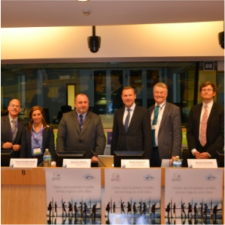Borders to Cross – a working conference on democratic innovation and civic driven change – took place in Amsterdam on 29 – 31 October 2013. See: http://borderstocross.com/about/
Borders to Cross came into being out of a cross over of disciplines and generations and has evolved into an alliance of partners from various backgrounds. It was itself an experiment in co-creation between different sectors, professional backgrounds (government, society, academia).
The initiative for a learning conference on bottom up change by citizens and the necessary shift in responsibilities between government, society and market was taken by five Dutch professionals (Rense Bos, Hank Kune, Stefanie Schuddebeurs, Jan Schrijver and Ton van der Wiel) who recognized the need to learn from international practice and between sectors about democratic innovation and civic driven change. They saw that people throughout Europe are seeking a new balance between the responsibilities of government and an active society.
Government can no longer take sole responsibility for dealing with societal problems; citizens and NGO’s can no longer simply question or complain about what their governments do or don’t do. The role of social media and social entrepreneurship, the empowerment of stakeholders and the changing set of competencies for government professionals are vital issues. The idea of an intensive learning conference where social entrepreneurs, citizens, government professionals and market parties from all over Europe would gather and discuss innovative practice of democratic and social innovation was born.
The initiative was embraced by the Dutch Ministry of the Interior and Kingdom Relations under the condition that it would be organized in partnership. Support was soon gained from a diverse group of organisations, leading to partnerships in the financial and/or content-related sense with the City of Amsterdam, Network Democracy, the University of Amsterdam and the University of Leuven, G1000, European Cultural Foundation, European Alternatives, Agentschap NL, the ministry of Health, Welfare & Sport (VWS), and the ministry of Infrastructure & Environment (I&M). European Civic Forum, the European Year of the Citizen Alliance, the Erasmus Prize and Kracht in NL were also supporters of the conference.
This timely alliance was able to realize Borders to Cross in the European Year of the Citizen.
Thirteen years ago in Maastricht (October 5-7th, 2000), policy-makers, practitioners and social scientists from all over Europe came together in order to share new insights and good practices about citizen participation. The event was also called Borders to Cross. In 2013, 13 years later, it was once again time to cross borders in order to learn with and from each other – citizens, policy-makers, public sector professionals and social scientists – about how to innovate both civic society and the the public sector.


